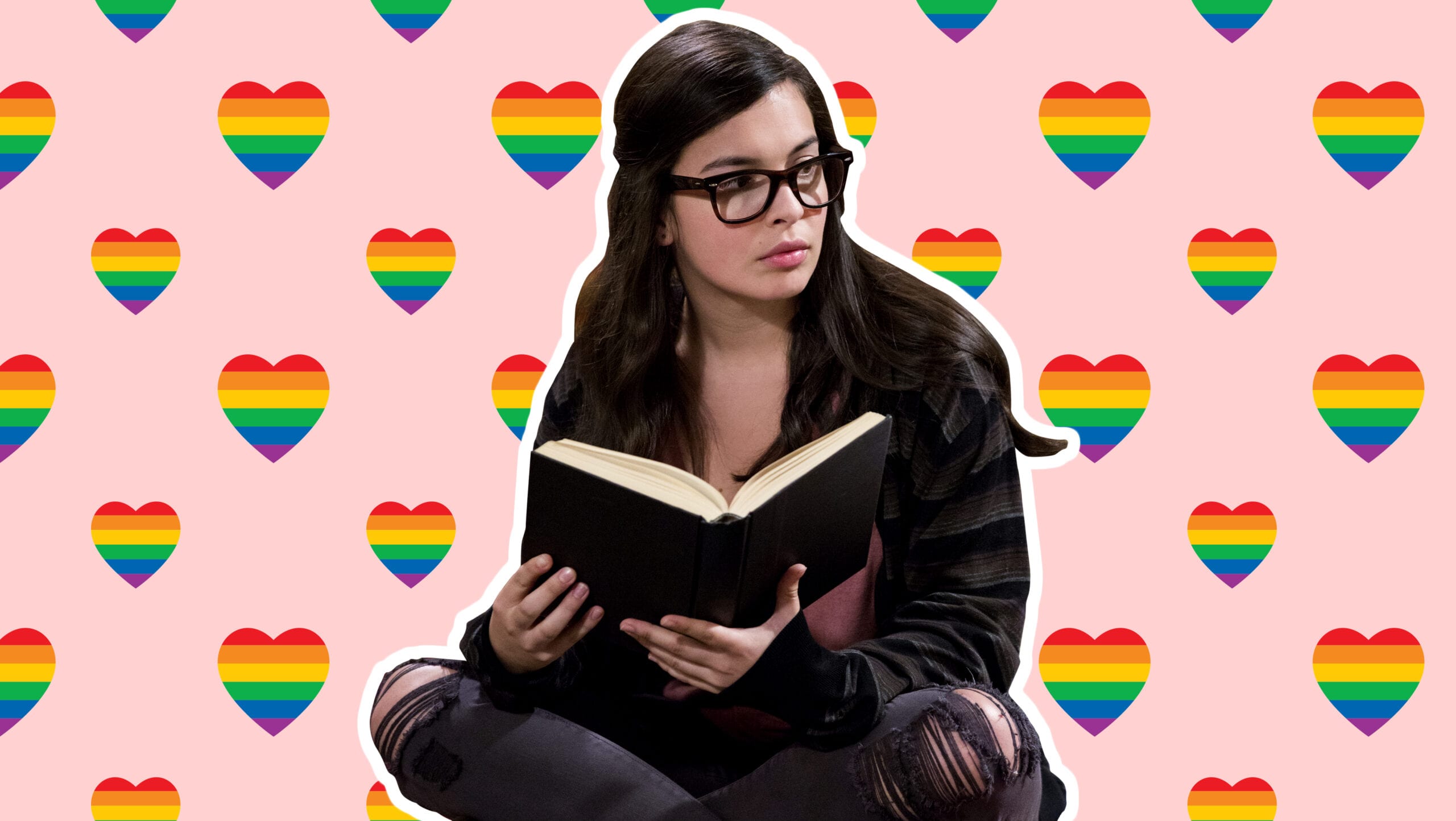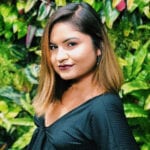Sitting across from my therapist in a tiny room filled with books, candles and the scent of lavender, tears streamed down my face: I was a wreck. The anxiety I had only just started to name filled my belly like a hot air balloon; I felt like I couldn’t breathe. The sobs trapped in my throat pushed every word out of my mouth like stones.
“I’m… scared,” I told her.
“Why honey?”
“Because if I’m gay, I’ll disappoint everyone.”
I hated myself for speaking the words, for even thinking about the internalized homophobia I had long held and tended to. “And if I’m gay, I’ve wasted so much time,” I added. “So much of my life, not being me. Hiding.”
I first began seeing my therapist in October 2018 to treat an undiagnosed anxiety disorder. I didn’t even mention the topic of my sexuality until the following January, when the words tumbled out of me unexpectedly: “I think I might be gay.” But even uttering them pushed me to uncontrollably sob and panic. My therapist told me this was the biggest wall we’d have to encounter, the structure of it so well put together that smashing it with a hammer would only deplete me. “So we’ll chip away at it, until we can reveal a tiny hole that we can peek through. And we’ll do it together.”
But as I left her office that day, I considered: Would I regret knocking down my own walls? At 26, I thought my years of living unapologetically queer were over, that I had somehow missed the youth gay train—sorry, no admittance for late bloomers, I’d told myself. I had no map, no guide.
Growing up with a conservative Central American family, I assumed heteronormativity was my normal, and that kept me silent. I grew up surrounded by the idea that queerness was wrong and sinful. My Catholic family members—especially the macho men in my family who rarely attended Sunday service—spewed homophobic slurs and jokes like they were gospel. In response, I kept my head down like most of the women in my family.
The only representation I ever saw growing up, on Spanish-language TV, didn’t help either. Gay men were always the butt of the joke on Univision sitcoms, in stand-up comedy, on telenovelas. And Latina lesbians? They were nowhere to be found. I never had a blueprint for how to use the fiercely feminist, independent queer voice I had inside of me. Instead, I spent my youth protecting it from the cacophony of homophobia around me. Had that protection walled off the opportunity to live authentically and unapologetically as a young adult?
It was only through the representation of characters like me—young, Latinx queers finding themselves despite their conservative familial or cultural obstacles—that I was able to break down that wall.

Around the time I started my journey in therapy, I sat down to watch One Day at a Time for a weekend TV binge after friends recommended the series to me. The show follows the Cuban-American Alvarez family as they tackle issues like immigration, homophobia and racism. Last month, it was resurrected by Pop TV for a fourth season after it was cancelled by Netflix and devout fans petitioned on social media to have it renewed elsewhere.
After witnessing the show’s eldest daughter take to the screen for the first time, I quickly joined the ranks of devout fans. Elena Alvarez, with her Catholic school uniform and fierce devotion to social justice, seemed to illuminate the pit of my anxiety, pouring light into my childhood wounds. Portrayed by Isabella Gomez, Elena is a nerdy teenager with a knack for video games and a passion for political debates. The series follows Elena as she dates a boy and slowly begins questioning her sexuality (and checking out lesbian porn) before coming out to her entire family. Eventually, she falls in love with the non-binary and equally nerdy Syd.
Elena’s hilarious and, at times, heartbreaking struggles stuck with me. I laughed tears of joy when Penelope, Elena’s devoted mom, fully embraced her daughter after she came out as a lesbian. I trembled with uncertainty and then howled with laughter when Lydia, Elena’s grandmother, processed Elena’s coming out in less than 10 seconds, choosing her granddaughter over her conservative values. And I fell apart at the sight of Elena being abandoned by her father, Victor, at her quinceañera, only to be stitched up again when her entire family embraced her on the dance floor.
I wish I could say Elena’s experiences mimicked mine as a teen. But I never experienced a parent telling me it was okay to be gay. Instead, I had parents who made jokes at queer people’s expense. I never even had a quinceañera. I spent my teen years quiet and hidden, going through the motions with suffocating social anxiety.
“I had something to celebrate: Coming into my own sexuality felt like being a teen again. I was free, wild and seen”
In the middle of high school, the undocumented half of my family had to make the trek back to Guatemala to gain residency in the United States. I was apart from my loved ones for months, further isolating me at a time when I deeply needed connection and community. Elena reflected parts of myself that had been neglected: My obligation to be a good daughter, my family’s immigration status and my culture’s deeply conservative ideas. In a season-long tug of war, for instance, Elena’s grandmother, Lydia, chides Elena for at first refusing to have a quinceañera because of the tradition’s misogynistic history. Lydia suggests that if Elena doesn’t have a party, she’s throwing away her Cuban heritage. Elena, hurt by her grandmother’s assertions, responds: “Only the bad parts.” Eventually, Elena relents to please her mom and grandmother. And in the end, Lydia designs a pantsuit dress for Elena’s party, accepting her granddaughter for who she is. This radical act of love helps release Elena from the obligation to hide her true self for the sake of being a good Cuban daughter. She marches out to her party, proudly rocking the pantsuit in front of her entire Cuban family.
Through the liberation Elena gifted me, she pulled back the curtain on all the places I thought I’d missed: In the fierce feminist diatribes I would spew during summers back from college (regardless of my siblings’ eyerolls); in the bodies I only just started to see differently on the dance floor of New York City’s iconic lesbian bar, Henrietta Hudson; in the queer friendships I started to develop in an effort to find something that was missing. I was in deep mourning for the welcoming, inclusive teenagehood I wished I’d had, but I had something to celebrate, too: Coming into my own sexuality felt like being a teen again. I was free, wild and seen.
Elena’s devotion to self-preservation kept her centered in the face of all challenges, something that I needed to bear witness to as an adult. When she first comes out to her father, for instance, he immediately dismisses her. “You’re just confused. You’re 15,” he tells Elena. “You don’t know what the hell you’re talking about.” I had imagined those same words being spewed at me from a loved one a million times before. In the aftermath of his abandonment, Elena suffers internally, losing weight and falling into a depression. But she holds on to who she is surrounded by the family that chooses to support her. She continues her queer activism and eventually opens herself up to love with Syd, a fellow Gay Student Association member. Her father may have dismissed her because of his own internalized homophobia, but Elena never lets that rejection stop her from living her queer life out loud.
“‘I’m pretty great,’ says Elena, in a memorable confrontation with her father. And in that moment, I knew my queer self was pretty great, too”
It was the message I needed. At the time, I was nowhere near ready to come out to my Catholic mother, or to post anything on my Instagram remotely queer in fear of family gossip. But to see 16-year-old Elena live her happiest gay life on TV, accepted and loved, gave me the resolve to go back to my real younger self in every therapy session and save her from hating herself. Session after session, I returned to painful moments of my childhood, moments where adults who were supposed to protect and accept me chose to silence and terrorize me instead. I comforted the teenage me, giving her the assurances she needed to prevail. I envisioned myself holding her, and holding space for the turmoil and confusion inside her. “It’s going to be ok,” I would whisper into her ear. “You are safe now with me.”
Elena’s journey showed me that the deeply homophobic culture I grew up in was at fault for making me feel like I was less than worthy. “Because I’m pretty great,” says Elena, in a memorable confrontation with her father. “I just feel sorry for you, man.” And in that moment, I knew my queer self was pretty great, too.

These days in therapy, I celebrate every queer bucket list item I tick off: Drunken kisses with girls at Henrietta’s, walking in my first Pride march only months after I came out to my friends and coming out to my first family member one year after that first therapy session. I tell my therapist about each accomplishment with childish abandon, giggling when I feel joy, stoic when I still feel shame. My therapist welcomes every feat, fear and emotion, never undermining the importance of each step I take from behind the wall. For every first I fear, I remind myself of the bravery of my community, of the women in my family who fought their own battles to survive here and of Elena. The unapologetic spirits of these women should be the springboard for more young, queer Latinx women on television—women like Lucia Acosta from the Party of Five reboot, or Emma Hernandez from Vida. So many of us are still pickaxing at the walls that keep us secluded. I want them all to know how less lonely it is when the first beams of light peek through the holes.
We need young adult heroes like Elena now more than ever; characters who prove to be valuable for Latinx queer women who, at whatever points in their lives, will eventually take a swing at the structures that hold them down. When I took a pickaxe to the wall blocking my sexuality, I had help. Peeking through the hole I made for the first time, I saw myself, 16 and proud, waiting for the heroine who was going to set her free.


 Why you can trust Xtra
Why you can trust Xtra


